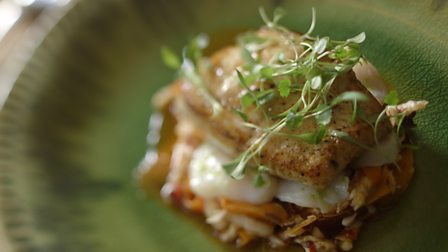
You need JavaScript to view this clip.
Preparation time
overnight
Cooking time
less than 10 mins
Serves
Serves 4
This Korean staple is easy to make and has a spicy kick that works well with fish, meat and all sorts of leftovers.
Put the rice wine vinegar, fish sauce, palm sugar and Korean chilli powder into a small saucepan and bring the mixture to a gentle simmer, stirring until the sugar dissolves. Stir through the lemon juice.
Mix together the cabbage, chillies, carrots, ginger, garlic and seaweed in a large bowl. Transfer to an airtight container.
Pour the hot lemon mixture over the vegetables, seal the container, then shake to coat the vegetables in the marinade. Set the container aside to cool, then leave for 1 week at room temperature to ferment.
When the kimchi has fermented, slice the scallops very thinly and arrange them on a serving platter. Sprinkle over the lime zest, then squeeze over the lime juice. Season, to taste, with salt.
Heat the rapeseed oil in a frying pan over a medium to high heat. Add the halibut steaks, presentation side down, and fry for 1-2 minutes, then add the butter and fry for a further minute. Turn over and fry the halibut on the other side for a further 2 minutes, basting continuously with the pan juices.
To serve, spoon a portion of the kimchi onto each plate. Top with some of the sliced scallops, then lay one halibut steak on top. Garnish with a little coriander cress.
It’s very important to keep the kimchi in an airtight container while it ferments. When the kimchi has fermented, it can be used immediately or, once opened, it can kept in a fridge for up to 1 month.
Recipes from this episode